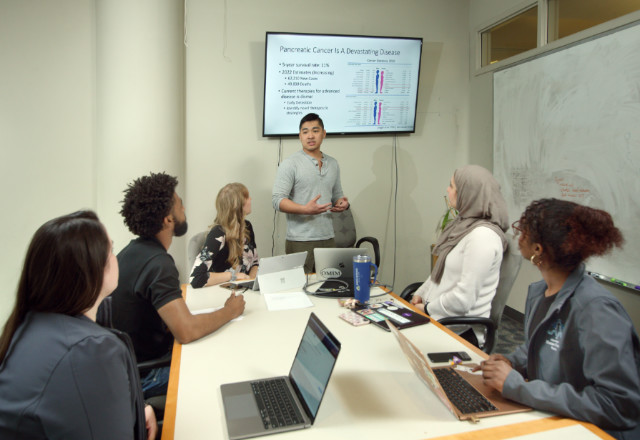Program Background
A graduate training program in human genetics was established at the Johns Hopkins University in 1957 under the direction of a university-wide committee to train highly qualified people for academic careers in human genetics. Our program was revised extensively in the mid-1980s, acquiring a new focus of providing a firm foundation in human biology, molecular biology and genetics along with rigorous training in state-of-the-art research methodology. The program provides an alternative to the combined M.D./Ph.D. program for those who want to carry out genetic studies in man but do not want the M.D. degree.
Building the Curriculum

Our program recognizes increasing opportunities for non-physician geneticists who have been trained in human biology. We believe that it is not sufficient to expose students to research problems in human genetics without providing basic knowledge of the human phenotype. Therefore, in addition to courses in molecular biology, biochemistry and genetics, our students receive basic information about the human organism so that they will be able to think creatively about their experimental organism.
Our program also provides rigorous training in research. Through continuous laboratory experience and research conferences, the student develops knowledge of the scientific process. The preceptors have been chosen because of their research interests and productivity. Each is committed to active participation in the teaching program. All are involved with eukaryotes and most of them with human-oriented research.
Initially the course of study is similar for all students, consisting of basic lectures in human biology, molecular biology and genetics. Later, the individual programs diverge, according to the student’s research interests. The trainee may choose a program with emphasis in molecular genetics and genomics, bioinformatics, biochemical genetics, cancer genetics, immunogenetics, population genetics or related fields. Faculty advisors are available to discuss career planning with the student. The overriding goal is to provide each student with a quality training experience that will prepare them for a career in the area of their choosing.
Fostering a Diverse Learning Environment
Students benefit from the enormous quantity and outstanding quality of activities in human genetics taking place at the Hopkins Institutions. In fact, because of the breadth of research activities and the large number of laboratories available for research training, our program provides a unique atmosphere for graduate training.
The School of Medicine and The Johns Hopkins Hospital furnish an excellent environment for research training in human genetics. The activities in human genetics are coordinated through the McKusick-Nathans Institute, within the Department of Genetic Medicine, the only School of Medicine department that has both clinical and foundational science faculty. Activities include courses in human genetics and medical genetics, a postdoctoral training program in human genetics, research conferences and journal clubs, as well as clinical conferences and an intensive summer course in mammalian genetics at The Jackson Laboratory in Bar Harbor, Maine. The clinical facilities provide superb opportunities for students to observe variations in human phenotype and to learn about relevant problems in medical genetics. They also provide a wealth of research material, rarely equaled elsewhere.
While the training program is strictly a Ph.D. program, the Master’s degree is available with a thesis in cases where performance has been adequate, but termination or transfer to another institution is deemed appropriate. Our program aims to provide research training in human genetics and therefore is not suitable for those whose interest is limited to genetic counseling.
